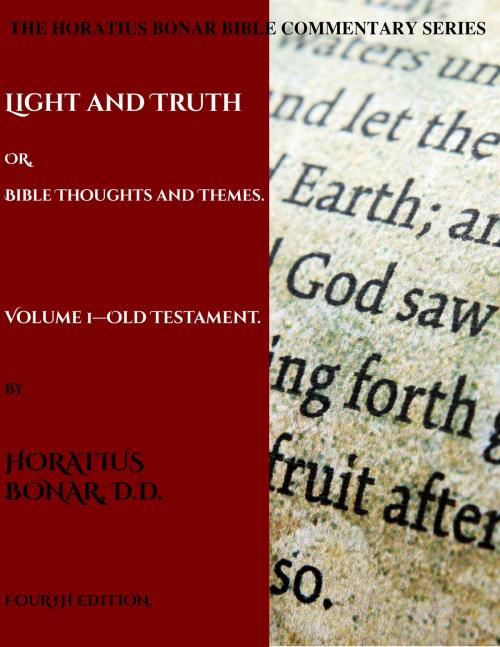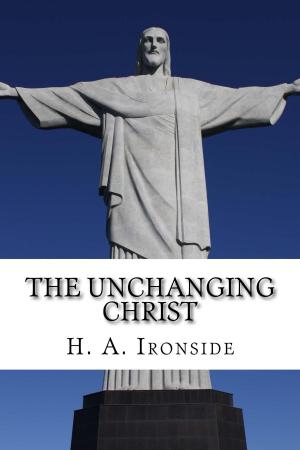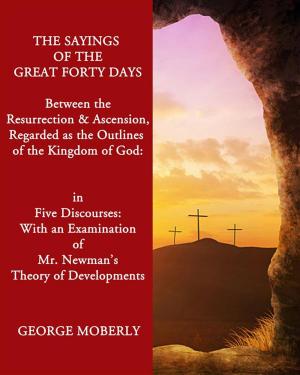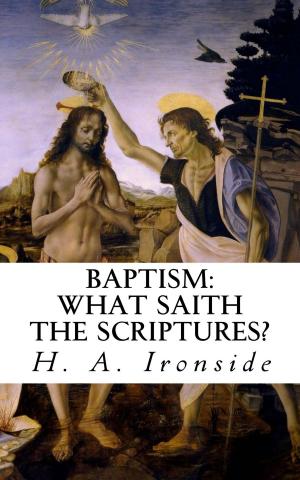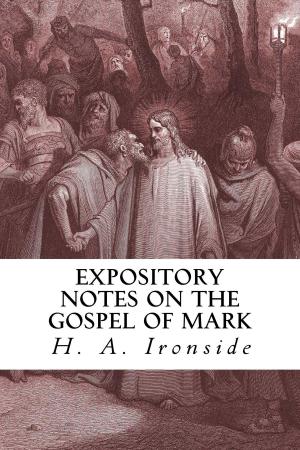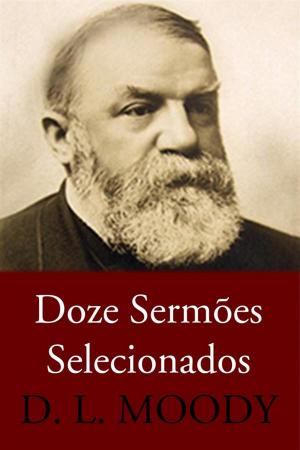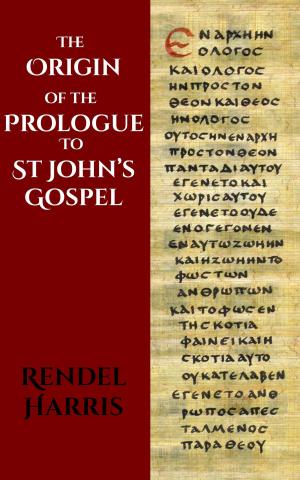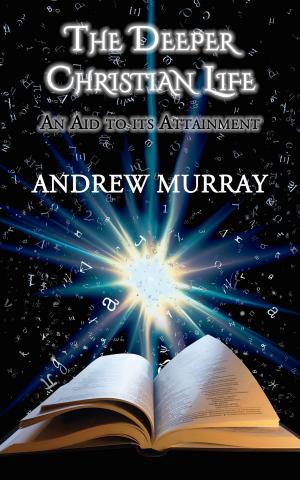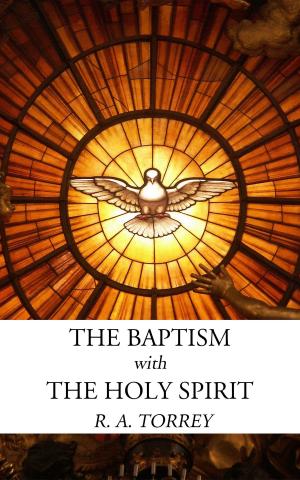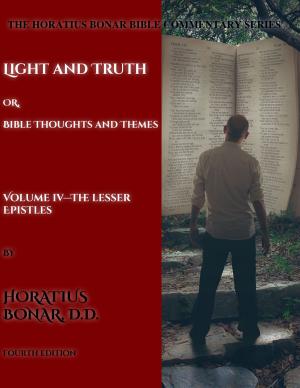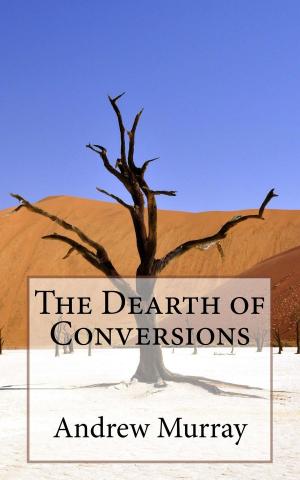Bible Thoughts and Themes: Volume 1
Old Testament
Nonfiction, Religion & Spirituality, Bible & Bible Studies, Meditations, Old Testament, Commentaries| Author: | Horatius Bonar | ISBN: | 1230001939439 |
| Publisher: | CrossReach Publications | Publication: | September 27, 2017 |
| Imprint: | Language: | English |
| Author: | Horatius Bonar |
| ISBN: | 1230001939439 |
| Publisher: | CrossReach Publications |
| Publication: | September 27, 2017 |
| Imprint: | |
| Language: | English |
“All the rivers run into the sea, yet the sea is not full,” said the wisest of the wise. We might add to this, and say, “All the rivers come out of the sea, yet the sea is not empty.” All the books in the world have, more or less directly, come out of the Bible, yet the Bible is not empty. It is as full as at the first. Let us not be afraid of exhausting it.
There is but ONE book that would bear such study. Let us be thankful that our world does contain such a book. It must be superhuman, supernatural. Blessed be God that there is at least one thing thoroughly superhuman, supernatural in this world; something which stands out from and above “the laws of nature”; something visible and audible to link us with Him whose face we see not and whose voice we hear not. What a blank would there be here, if this one fragment of the divine, now venerable, both with wisdom and age, were to disappear from the midst of us; or, what is the same thing, the discovery were to be made that this ancient volume is not the unearthly thing which men have deemed it, but, at the highest estimate, a mere fragment from the great block of human thought,—perhaps, according to another estimate, a mere relic of superstition.
“Bring the Book,” said Sir Walter Scott, upon his deathbed, to Lockhart. “What book?” asked Lockhart. “What Book?” replied the dying novelist, “there is but ONE Book.” Yes; there is but one Book, and we shall one day know this, when that which is human shall pass away (like the mists from some Lebanon peak), and leave that which is divine to stand out and to shine out alone in its unhidden grandeur.
God is now recalling humanity to the book which was written for it. By the very attacks made on it by enemies, as well as by the studies of its friends, he is bringing us back to this one volume, as the light shining in a dark place. That we may know the past, the present, and the future, he is bidding us betake ourselves to it.
Let us read it, let us study it, let us love it, let us reverence it.
It will guide, it will cheer, it will enlighten, it will make wise, it will purify.
It will lead us into all truth. It will deliver us from the fermenting errors of the day. It will save us from the intellectual dreams of a vain philosophy, from the vitiated taste of a sensational literature, from the specious novelties of spiritual mysticism, from the pretentious sentimentalisms of men who soar above all creeds and abhor the name of “law,” from Broad Churchism, and High Churchism, and no Churchism. It will lead us into light and love, into liberty and unity, imparting strength and gladness.
This Book is “the word of God.” It contains “the words of God,” but it is “the word of God,” the thing that God hath spoken to man. Being the word of God, that which it contains must be the words of God.
“All the rivers run into the sea, yet the sea is not full,” said the wisest of the wise. We might add to this, and say, “All the rivers come out of the sea, yet the sea is not empty.” All the books in the world have, more or less directly, come out of the Bible, yet the Bible is not empty. It is as full as at the first. Let us not be afraid of exhausting it.
There is but ONE book that would bear such study. Let us be thankful that our world does contain such a book. It must be superhuman, supernatural. Blessed be God that there is at least one thing thoroughly superhuman, supernatural in this world; something which stands out from and above “the laws of nature”; something visible and audible to link us with Him whose face we see not and whose voice we hear not. What a blank would there be here, if this one fragment of the divine, now venerable, both with wisdom and age, were to disappear from the midst of us; or, what is the same thing, the discovery were to be made that this ancient volume is not the unearthly thing which men have deemed it, but, at the highest estimate, a mere fragment from the great block of human thought,—perhaps, according to another estimate, a mere relic of superstition.
“Bring the Book,” said Sir Walter Scott, upon his deathbed, to Lockhart. “What book?” asked Lockhart. “What Book?” replied the dying novelist, “there is but ONE Book.” Yes; there is but one Book, and we shall one day know this, when that which is human shall pass away (like the mists from some Lebanon peak), and leave that which is divine to stand out and to shine out alone in its unhidden grandeur.
God is now recalling humanity to the book which was written for it. By the very attacks made on it by enemies, as well as by the studies of its friends, he is bringing us back to this one volume, as the light shining in a dark place. That we may know the past, the present, and the future, he is bidding us betake ourselves to it.
Let us read it, let us study it, let us love it, let us reverence it.
It will guide, it will cheer, it will enlighten, it will make wise, it will purify.
It will lead us into all truth. It will deliver us from the fermenting errors of the day. It will save us from the intellectual dreams of a vain philosophy, from the vitiated taste of a sensational literature, from the specious novelties of spiritual mysticism, from the pretentious sentimentalisms of men who soar above all creeds and abhor the name of “law,” from Broad Churchism, and High Churchism, and no Churchism. It will lead us into light and love, into liberty and unity, imparting strength and gladness.
This Book is “the word of God.” It contains “the words of God,” but it is “the word of God,” the thing that God hath spoken to man. Being the word of God, that which it contains must be the words of God.
